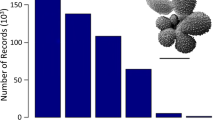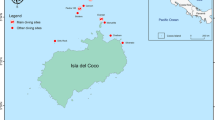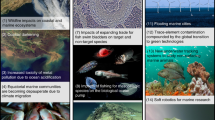Abstract
THE occurrence of the pelagic and planktonic floating barnacle, Lepas fascicularis, on the shore at New Train Bay, Trevone, near Padstow, Cornwall, in the summer of 1933, is an event sufficiently rare to be worthy of record along with other unusual marine events of that outstanding year.
This is a preview of subscription content, access via your institution
Access options
Subscribe to this journal
Receive 51 print issues and online access
$199.00 per year
only $3.90 per issue
Buy this article
- Purchase on SpringerLink
- Instant access to the full article PDF.
USD 39.95
Prices may be subject to local taxes which are calculated during checkout
Similar content being viewed by others
References
Darwin, "Monograph of the Cirripedes". Lepadidæ, 1851.
Gruvel, "Monographic des Cirrhipèdes ou Thécostracés", 1905.
Murray and Hjort, "Depths of the Ocean", pp. 711 and 710, 1912.
Matthews, Int. Fish. Invest. Mar. Biol. Assoc., Cmd. 4641, 1909.
Vallentin, J. Roy. Inst. Cornwall, 55; 1907.
Nichols, Irish Nat., 24, 10; 1915.
Norman and Brady, Trans. Nat. Hist. Soc. Northumb., Durh. and Newcastle, N.S., 3, 2; 1909.
Cocks, Ann. Rep. Cornwall Poly. Soc., 1849–50.
Pilsbury, Bull. U.S. Mus., 60; 1907.
Schaper, Wiss. Meeres., Kiel, 19, 1919–22.
Author information
Authors and Affiliations
Rights and permissions
About this article
Cite this article
ORTON, J., RAWLINSON, R. The Floating Barnacle on the North Cornish Coast in the Summer of 1933. Nature 133, 418 (1934). https://doi.org/10.1038/133418a0
Issue date:
DOI: https://doi.org/10.1038/133418a0
This article is cited by
-
Das auftreten von Lepas fascicularis Ellis & Solander (Crust. Cirr.) in der nordsee
Zeitschrift f�r Morphologie und �kologie der Tiere (1967)



